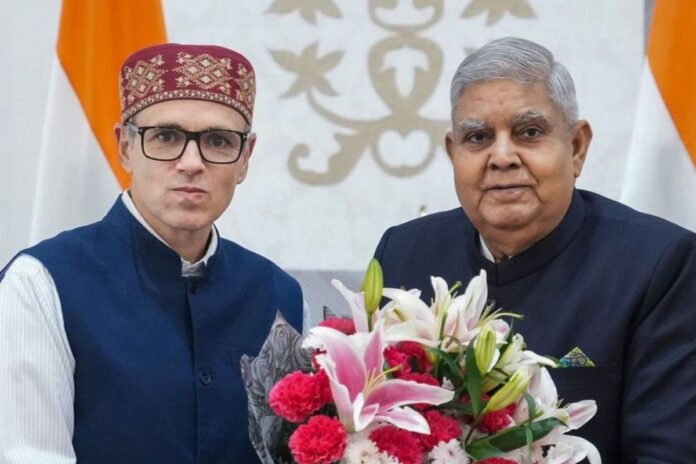Jammu and Kashmir Chief Minister Omar Abdullah, currently on an official visit to Delhi, met Vice-President Jagdeep Dhankhar on Wednesday. The meeting, which took place at the Vice-President’s Enclave, was part of Abdullah’s effort to discuss critical matters pertaining to the development and challenges facing Jammu and Kashmir.
A photo of Abdullah and Dhankhar warmly exchanging greetings was shared on the official X handle of the Vice-President’s office, accompanied by the caption, “Shri Omar Abdullah ji, Hon’ble Chief Minister of Jammu and Kashmir, called on Hon’ble Vice-President Shri Jagdeep Dhankhar at Vice-President’s Enclave today.” The meeting lasted for over 30 minutes, with officials noting that the two leaders discussed various issues related to the Union Territory, including infrastructure development, socio-political matters, and the region’s energy challenges.
Abdullah, who arrived in the national capital on Monday evening, is also likely to call on President Droupadi Murmu and meet Union Finance Minister Nirmala Sitharaman in the coming days, according to officials. The meetings are part of a series of engagements aimed at securing greater support and resources from the central government to boost Jammu and Kashmir’s economy and address the specific challenges faced by the region.
On Tuesday, Abdullah attended a conference of power ministers from states and Union territories. During his address at the event, he emphasized the challenges Jammu and Kashmir faces due to the limitations of the Indus Water Treaty. He highlighted that the treaty’s restrictions are hampering the Union Territory’s ability to harness its significant hydropower potential.
The Indus Water Treaty, signed in 1960 between India and Pakistan after nine years of negotiations, involves cooperation and information sharing regarding the use of waters from several cross-border rivers in Jammu and Kashmir. The World Bank is also a signatory to the treaty. The agreement, which regulates the flow and usage of rivers between the two nations, has had a significant impact on Jammu and Kashmir’s hydropower development.
Abdullah pointed out that the treaty only permits run-of-the-river projects, which prevents the construction of large storage reservoirs, thereby restricting the region’s potential to maximize its hydropower capabilities. “As a fallout of the treaty barriers, Jammu and Kashmir pays a heavy price in the peak winter months when power generation hits a low, creating hardships for its people,” Abdullah remarked during his speech at the conference. He stressed that hydropower remains the most viable energy source for Jammu and Kashmir, yet the region has been compelled to rely on power imports from other states, which has negatively impacted its economy.
The Chief Minister also called for special compensation from the central government to address these energy challenges. He suggested that Jammu and Kashmir should receive viability gap funding and equity assistance to tap into its untapped hydro-energy potential. Abdullah argued that these measures would not only help the region achieve energy security but also foster economic growth by reducing dependence on external power sources.
Abdullah’s ongoing visit to Delhi and his series of high-profile meetings come at a crucial time for Jammu and Kashmir, as the region seeks to navigate its way through economic challenges and energy constraints. The Chief Minister’s push for central assistance and his focus on hydropower development reflect the broader goals of ensuring sustainable development and enhancing the quality of life for the people of Jammu and Kashmir.

